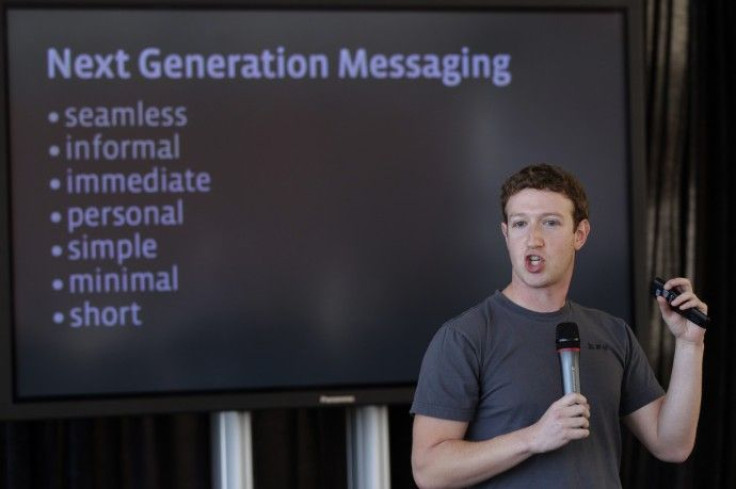Why Facebook can't kill e-mail?

Facebook on Tuesday unveiled a revamped messaging service at an event that was closely watched across the globe due to the hype over what was expected to be the launch of a 'Gmail Killer'. With the Facebook CEO Mark Zuckerberg treading cautiously against reasserting the label of 'Gmail Killer', the media technocrats were forced to transform the label to 'e-mail killer'.
The 'death of the e-mail' theory comes from the social networking site's new offering of '@facebook.com' e-mail service, which are aimed at luring the Facebook users with the promise that they don't have to go to e-mail services of Yahoo, MSN and Google to get in touch with their non-Facebook friends.
I don't expect people to wake up tomorrow and say, 'I'm going to shut down my Yahoo account or my Gmail account'...Maybe one day, six months, a year, two years out people will start to say this is how the future should work, Zuckerberg is quoted as saying at the San Fracisco event.
Describing the new messaging service that integrates all web and text-based communications, the 26-year-old CEO added, We want people to be able to communicate in whatever way they choose: email, text or Facebook message.
He also chose to stress that the new messaging service that was aimed at reducing the cognitive load on the youngsters was not e-mail.
Agreed that the world's youngsters prefer chatting and texting over communicating through e-mail and that creation of such an integrated communications platform is commendable. But does this really spell the end of e-mail? No. Here are three reasons why:
1. Demographics: Population, Internet Penetration Vs Facebook Users
Facebook's ambition of wiping out e-mail from the face of the Earth faces a very basic demographic hurdle. Even though internet penetration continues to grow rapidly across the globe, there isn't much to prove that the number of Facebook users also grow along the same lines.
The country ranked first on the population scale, China boasts of human strength of 1,340,670,000 as of Nov. 17, 2010. While the internet penetration in Asian countries is gradually on a rise, a peak into the Google Ad Planner gives the real idea of Facebook's reach in the communist nation - a meager 0.9 percent. Similarly, Facebook has a reach of 5.3 percent in Japan while Vietnam has a little over 10 percent as against the world-wide reach of 35.2 percent.
Two other countries struggling to climb up the internet penetration curve also figured on the 'Top 30 countries with highest number of Facebook users'. According to the official data released by the social networking site on July 1, 2010, Mexico figured 9th on the list and South Africa ranked 27th.
The neighbor of the US accounted for a whooping 436.8 percent growth in the number of Facebook users in 12 months with 14,600,300 people logging on to the networking site. But here is the reality bite, Mexico's July population stood at 108,396,211. Similarly, South African Facebook user-base grew 67.6 percent as against the numbers in 2009. The networking site claimed it had 2,884,080 users from South Africa, while the country's population stood at 49,991,300. You can do the math.
2. Users' Online Reputation Vs Real World Identity
From a larger sense of the world, on to a more personal worry for the users - the usage of the '@facebook.com' may not be preferred as their sole e-mail ID by many. Even though they might use the new e-mail service on the social networking site, several users would like to use and maintain another e-mail ID for official and professional purposes. Imagine writing a '@facebook.com' ID on your resume, for instance.
With the advent and growth of the social networking sites also came the rise of social concepts such as online identity and online reputation. Who you are on the internet and what you represent on the world wide web have evolved into significant factors that affect the way you are perceived in the real world.
Let's face it, the reason why we love to log on to our Facebook and Twitter accounts is due to the fact that these online platforms allows us to be who we are and even lets us hide behind an alter ego. Everyone loves their little rebellions and airing their grouses on the internet (although this has also become dangerous as several companies have begun dictating social media etiquette to employees). Think about it, would you want your future employer to know you are a sucker for gory games? Or would you be alright scaring away an investor with your anarchist wall posts?
3. Facebook's Security Troubles
Since the announcement of the new message service from Facebook, the media has been abuzz over the questions of security that the networking site would provide. As if to intensify these worries over Facebook's nasty reputation of lack of security, a bug has hit the site. Several reports of a Facebook bug deactivating a number of accounts on the social networking site surfaced just hours after the new messange service launch.
Despite new privacy settings built into its new messages system such as protection against receiving messages from people not on a trusted list, tech-juckies would still be reluctant to adopt the new service. Several tech websites and media organizations have even gone ahead and written copies on security implications of the new service, quoting security firms and experts cautioning the users.
Unless all these factors magically disappear, it is a long road for Facebook to eliminate e-mails off the internet.
© Copyright IBTimes 2024. All rights reserved.











